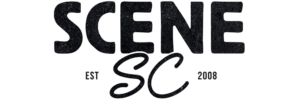
UPDATE: Dave Stone will be returning to Red Door Tavern on Friday, November 7th with co-headliner Lisa Best, another terrific comedian from LA. Show is at 9PM with a cover of only $7.
Dave Stone is an LA-based comedian originally from Atlanta, GA. This fall he is returning to tour across the southeast, where he developed his chops as a working comic. Dave have appeared on The Late Late Show with Craig Ferguson, Last Comic Standing, and Adult Swim’s Squidbillies. He was also recently a guest on Pete Holmes’ podcast, You Made It Weird, a favorite among many comedy fans and he was also featured in an episode of PBS Digital Documentary series Modern Comedian, in which he discussed how he lived in a van when first moved to LA. (He has since moved into an apartment, but this speaks volumes of his dedication to the pursuit of comedy.) He was named one of LA Weekly’s 12 Comics to Watch. Dave has been touring the country for years as a headlining comic and from ’08-’13 as a member of The Beards of Comedy.
Dave’s act is full of observations on southern culture and the lifestyle of a working comic, but it is his charm and on stage demeanor that make him such a joy to watch. I chatted with Dave on the phone to discuss comedy, touring, and taping for television.
Justin Thompson: How has the tour been going?
Dave Stone: It’s going very well. Exhausting, but it’s a lot of fun. The majority of these dates have been one-nighters, all but two of them. And they have also been every-nighters. So we have been on the move every day, driving between cities.
It’s the lifestyle that we lead, late nights after shows, hanging out with comics or whatever. Going to bed late, getting up early, driving a long time the next day. The previous two days we had back to back seven hour drives. That will wear you down, but our spirits are pretty high.
JT: How does performing on the road compare to doing shows in LA?
DS: It’s very different, I have always preached this theory, I believed it when I was in Atlanta and I still believe it in LA. I believe a good comic needs to do both: a comic needs to be part of a good scene, but also work the road. When you’re engulfed in a good scene, you’re surrounded by great comics and that is going to keep you honest in your back of the room sensibility, not that that should ever be a goal for a comedian. I just say that because it is synonymous with pushing it in comedy and originality. If you’re cracking up the back of the room, usually you’re doing some pretty interested stuff, as opposed to some generic hacky stuff. The scene keeps you honest with your originality but the road develops your chops, it teaches you how to actually be a working comedian, as far as performing every night for paid audience. You need to do both. It makes you well rounded.
JT: When I interviewed another former Beards of Comedy member Joe Zimmerman, he mentioned that he was also going out on the road by himself when the group started, is that what you were doing too?
DS: I started working the road on my own before The Beards even existed, then I continued to do both at the same time. We would tour for a few weeks, then I would go out on my own and then back and forth. I have tried to get out on the road as much as I can, as early as I can. My first exposure to the road was through clubs, as a feature comic. It started kind of regionally, so it wasn’t too difficult, once you crack the door open with certain clubs and bookers.
There is a lot of those shows and “road work” that doesn’t really make you much of a better comic, so that’s what lead The Beards and myself to have this desire to go out and do DIY shows, independent rooms bars, music venues, small theaters, basically any avenue other than a traditional comedy club. That’s kind of what this current tour is about. Out of the 23 cities I’m doing, only three of them are clubs. Everything else is independent stuff.
JT: What’s your writing process like?
DS: That’s a good question. I don’t think it’s a very unique process, I’m writing ideas down every day, the old cliche of a comic carrying around a small notepad everywhere. You can’t control what funny ideas will pop in your brain. unfortunately I’m not as disciplined as I would like, it’s not like I “write-write” everyday, but I will sit down about three times a week to flesh out those ideas. In addition to that, I will write on stage. Some guys do one or the other, I like to dabble with both. Writing on stage, meaning I will go on stage that night with an idea but with no real hard premise or direction to take it and just kind of explore it on stage in the form of a riff and see where it leads me. Sometimes doing it that way will take yourself in directions you may have not thought about if you sat down and tried to write it out. I try to do a bit of both.
I’m definitely not a free-form riff-type comic, although IÂ have been experimenting with that lately. I’ve always thought one of my strong points was being able to craft tight jokes that kind of move forward pretty quickly, to create a rhythm. I like to create a rhythm with a lot of jokes one after another. Most audiences have short attention spans, you can’t hem and haw, you can’t ramble, you have to make your point and get to the joke.
JT: How did you go about preparing for television spots?
My first was Ferguson, which was almost exactly a year ago. Although it wasn’t my first showcase set, a TV set and a showcase set are pretty similar in the sense that you want to give a well rounded representation of your act in one short set. Obviously a TV set has a little more magnitude. My point is that it was difficult. Right now as a headliner, I can go out and do an hour, on any given night. Most headliners, in reality have a lot more than 60 minutes of material, so you think you could just take out the best 5 minutes, but the formula isn’t that easy. The jokes kind of have to connect and give you a nice flowing tight five, which isn’t as easy as picking out what my best five minutes of jokes are, but what are the best five minutes of jokes that represent me as a comic? There were a million or so people seeing me for the first time that night, so I wanted a good impression. It took me a couple of months to prepare, but ultimately I was pretty pleased with it.
I always told myself it isn’t enough to just get the first TV spot, you want to do really well. You want to crush it. Occasionally there is always  excitement when “so and so is doing Conan” but the next day everyone goes, “Oh that was okay.”  It’s not good enough to just get it, you want to knock it out of the park. I don’t know if it was a home run, but I felt like it was a good ground-rule double and I will take that.
JT: Obviously living in the van wasn’t sustainable in the long-run, how did you decide the time was right to move out of the van?
DS: I was fortunate that the end of my psychological rope came at the beginning of an upswing in my career. Financially, I was able to get out and into an apartment. It couldn’t have come at a sooner time. The original plan was 6-9 months, and show business is such an unpredictable occupation that at the end of that window not a whole lot had changed as far as my career or financial situation, so I continued to stay in it.
JT: And now is it weird that you use that van to tour?
DS: The first night in this tour, when I was driving out from LA was very weird. It brought back all those old memories. I had been out of the van for months, but I still owned it and drove it around LA, but didn’t sleep in it. It was a weird feeling, almost like getting out of the van was a dream and I woke up and was still in it. But it’s not that bad, we have been doing a lot of hotels on this tour, but that first night back was an odd feeling. It was such a glorious moment when I finally got out of the van.
JT: I’m sure you had to remind yourself that it was for a purpose?
DS: It was very psychological, and it’s funny you asked that. I was constantly having to remind myself that I was doing it for a reason and that there is a good point behind all of this. Some nights you’re like, “What the hell am I doing with my life” then I have to remind myself that this was part of a plan that I chose to execute. As opposed to falling on hard times, with my life spiraling out of control.
JT:Â So, uh, what kind of music have you been listening to in the van?
DS: I’m a huge music fan. What IÂ have been listening to right now, I’ve been getting into Sturgill Simpson and Whitey Morgan and the 78’s. I’m a big country fan, but I despise modern national country music, or radio country, or whatever you want to call it. I’m more into alternative country. My favorite band in the world is Drive-By Truckers. I like the classic country and the outlaw country stuff, these two guys are modern guys but they have that outlaw, 70’s country sound to them. I’ve been digging it. Very heavily Waylon Jennings influenced, and if you’re going to be influenced by someone you can definitely do a lot worse.
JT: These are the fluff questions. What are your favorite fried foods?
My favorite fried foods, that is a tough alliteration right there. Well, probably fried chicken as an entree, and side dish, obviously. Well, not obviously, it’s not like anyone would know this, but I’m such a fan of fried okra. You can’t go wrong with fried okra.
It’s the best thing ever. I need to get a fried okra endorsement. I need to do a commercial for okra.
JT: Thanks for doing the interview, Dave.
Dave Stone will be performing tonight (10/22) at the Red Door Tavern in Columbia and Sunday at City Range in Greenville.Both shows will feature Atlanta comic Caleb Synan, who recently won second place in The Laughing Skull Comedy Festival.
10/22 Red Door Tavern 8:30pm Tickets are $7. Locals on the show are Jenn Snyder, Wayne Cousins, and Topher Riddle.
134 1/2 State St, West Columbia, South Carolina 29169
10/26 CityRange Grill 7:00pm $12 for General Admissions. Locals on the show are Carolyn Adams and Fray Forde.
615 Haywood Rd, Greenville, South Carolina 29607
Check out Dave’s appearance on The Late Late Show below and be sure to follow Dave Stone on Twitter @davestonecomedy


